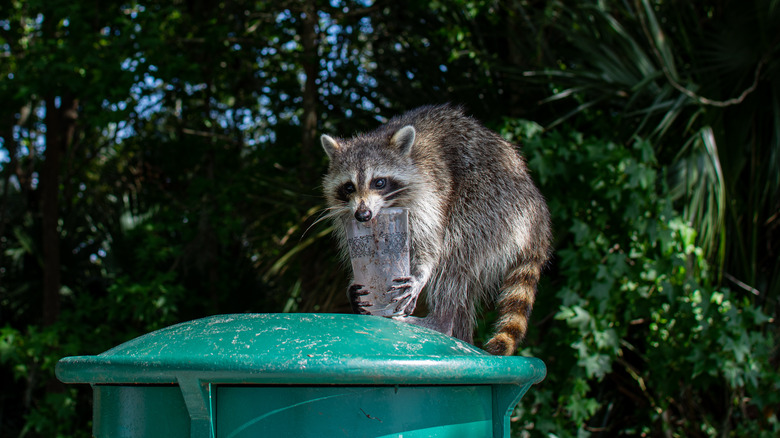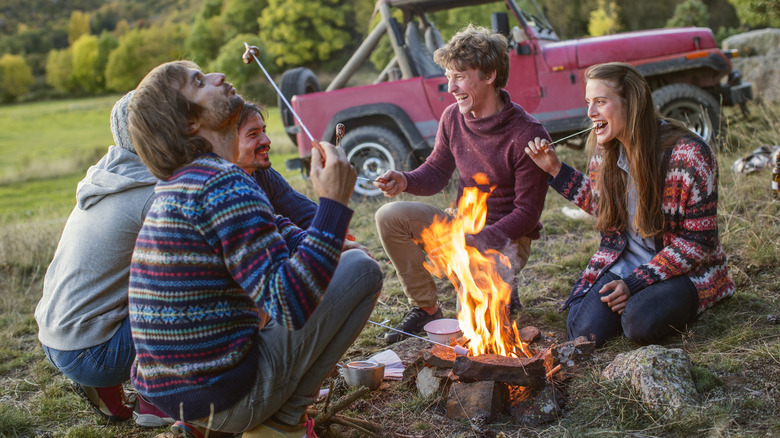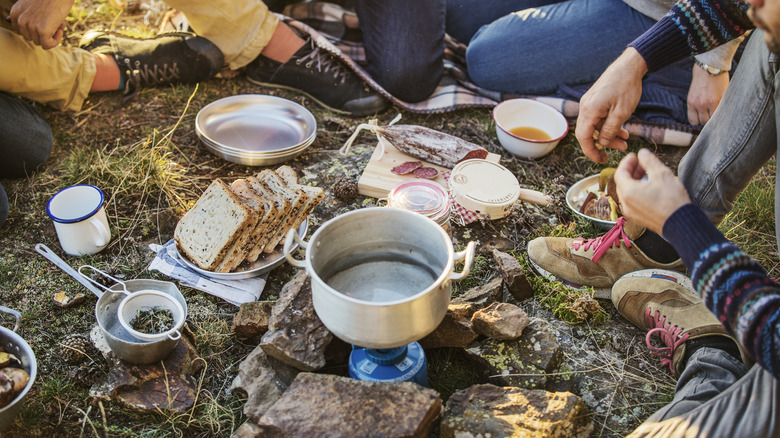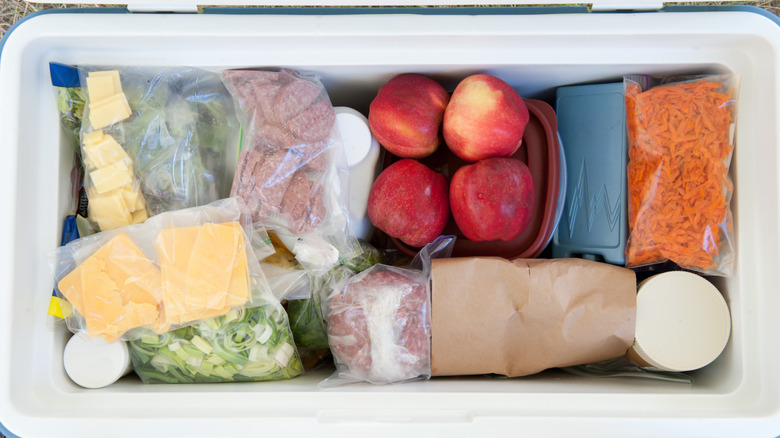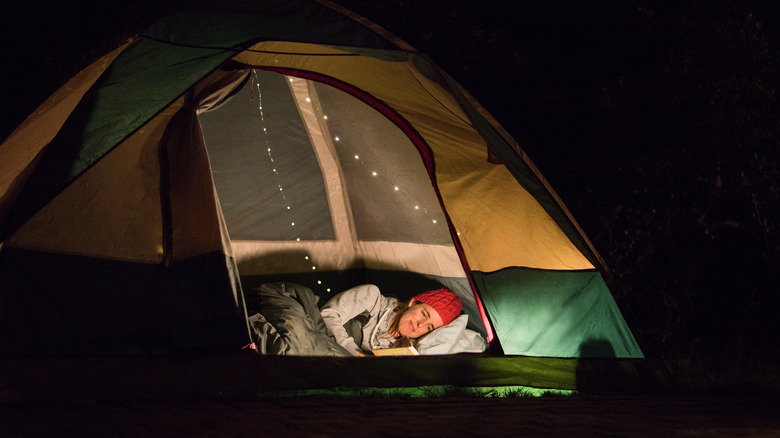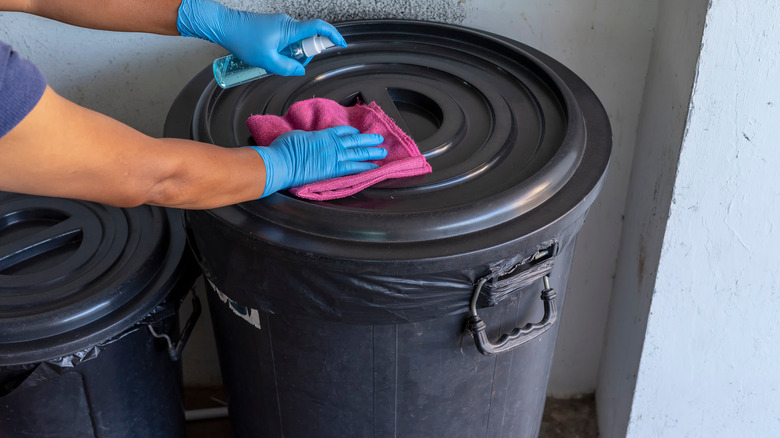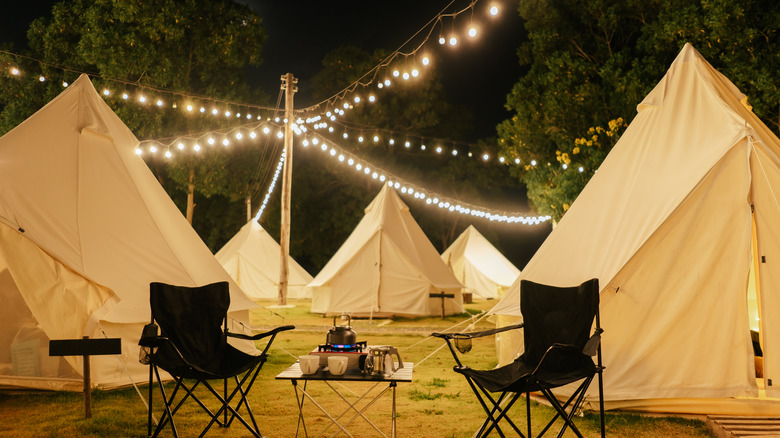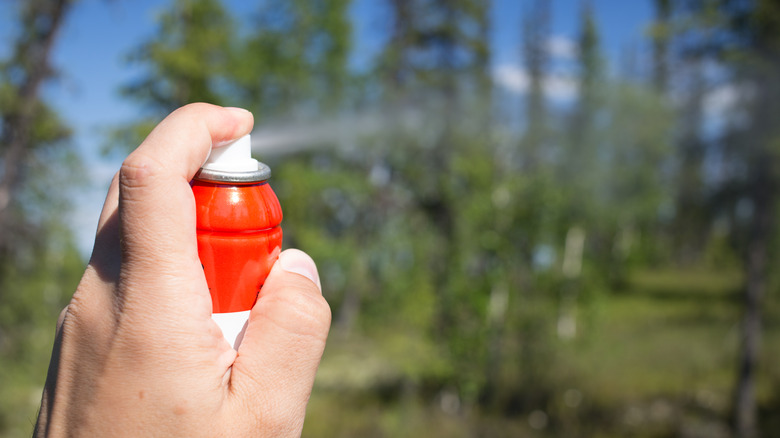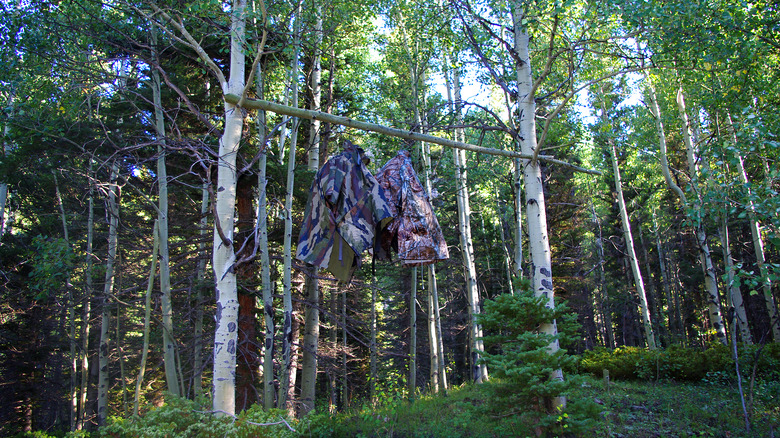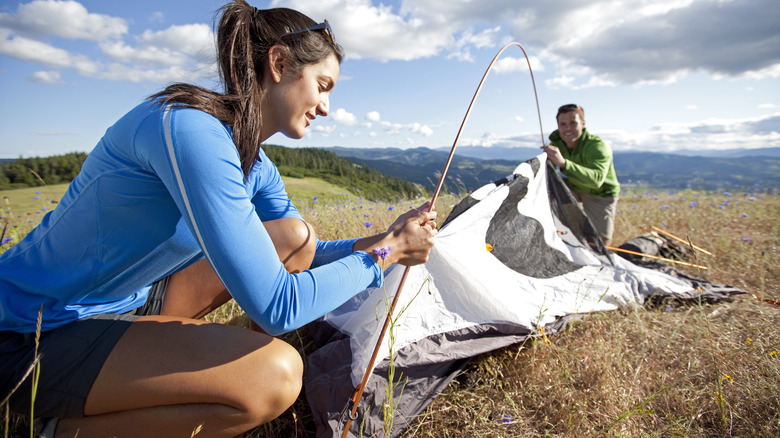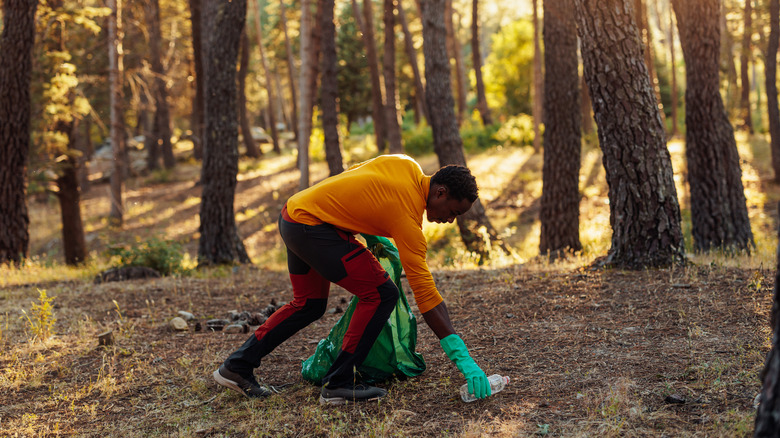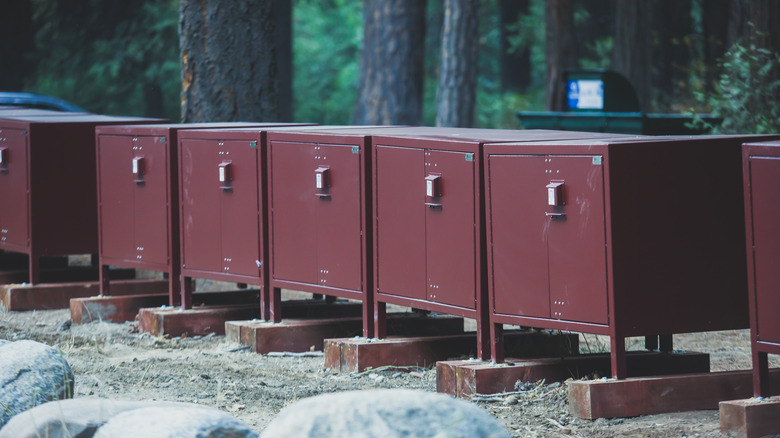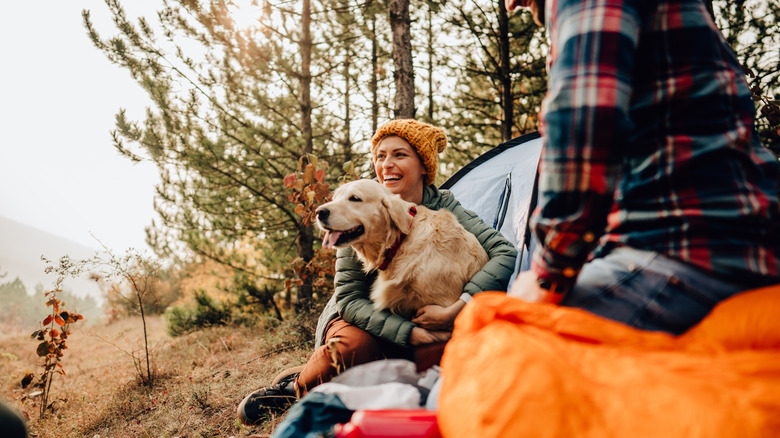Simple Hacks For Keeping Animals Away From Your Campsite Trash Cans
Camping is a great way to reconnect with nature. For many, it's an occasional pastime, but for others, it's a way of life or an extreme hobby. And no one wants their time in the wild to be ruined by animals tearing apart their trash cans in search of food. Not only is it an annoyance to clean up an animal-created landfill in the morning when you're trying to pack up and head home, but depending on which animals your trash cans attract, it can be outright dangerous. Think bears, wolves, mountain lions, or even a really irritated bobcat. Plus, no one wants to be an unintentional litterbug.
Nothing on this list is a "one size fits all" solution to keeping animals away from your campsite trash cans — especially since animals have become increasingly more comfortable with humans and more desperate for food and territory with the more wild spaces we take over. Using the tips in this article in conjunction with each other, preferably detailed to your specific camping location, will give you the best shot of avoiding extra clean up in the morning.
Make a ruckus and enjoy yourself
If there's one thing most animals try to avoid, it's humans. We've all heard the old saying, "Animals are more afraid of you than you are of them," and for the most part, that holds true. Granted, you might want to avoid having a party in the middle of a lion's den. But here in the U.S., making some noise will keep much of the troublesome wildlife away from your campsite, which is the first step in keeping those critters out of your trashcans. Make some noise, be loud, and have a ruckus good time. You'd be surprised how few critters are willing to approach a campsite with people singing, dancing, and heaving with laughter. The Colorado Department of Parks and Wildlife even recommends leaving a radio on at night because the sound of human voices will help deter bears from making a mess of your camping goods while in search of food.
That being said, it's important to check the restrictions for whichever campsite you plan to stay at. Many camping areas have quiet hours, and blasting music throughout the night could get you in a bit of trouble. Not to mention how it will likely annoy other campers if you spend the night at a site where tents are packed like sardines.
The less food waste, the less the temptation
When a hungry animal wanders into your campsite, the chance that you're the meal they're looking for is quite slim. Humans have flipped the natural order of the food chain on its head for millennia, and few animals in the United States have the audacity to hunt fully grown humans as a primary food source. Sure, there are exceptions, but even the largest predators in the country tend to shy away from humans. What these animals are really after is whatever smells are lingering in your trashcan, coolers, and cooking pot.
Limiting food waste can help keep animals from dumpster diving your camp garbage or sniffing around your campsite altogether. Try to avoid bringing foods with inedible wrappings. Instead of bananas, stick to grapes. Boneless meats prevent filling your trash can with the tastiest of natural chew toys. Likewise, attempt to limit making more food than you can eat because those leftovers will either go into the garbage or be tucked away in your cooler. Neither place does a very good job of masking scents from the power of noses evolved to sustain hungry predators and scavengers.
Some food waste might be unavoidable, and that's okay. The fewer tasty morsels there are to release chemical attractants in the air, the better your chances of keeping wild from encroaching on your trash cans.
Airtight means fewer smells to draw an animal's attention
As mentioned, smells are probably the strongest attractant for wild animals. For critters, it's their noses that allow them to find food over distances long and short. The scents on the wind can drift on air currents for quite a distance, and once animals have been attracted to your campsite, the smells from your trash cans will allow them to pinpoint exactly where all those delicious, discarded goodies are hidden.
Keeping food and trash in airtight containers helps reduce the number and strength of scents that entice the creatures near you into paying your trash cans an unexpected visit. This could be as simple as keeping food in ziplocked baggies inside a cooler, but the more layers you have, the more effective it'll be at reducing smells. You can get creative and pack your trash into an airtight plastic or go the easy route and double or triple bag it. It really depends on what you're capable of carrying. If you're on a long hike, lugging a tote around will get cumbersome quickly, whereas a roll of heavy-duty trash bags can be stuffed in your pack without taking up much room.
Precook your meals before hitting the timber
Precooking your meals at home does a couple of important things. To begin with, it helps reduce your food waste since you can leave all of those undesirable scraps in your trash at home. It also means you won't have to actively cook at your campsite — talk about a critter magnet.
If raw foods give off scents powerful enough to entice nearby animals towards your coolers on their own, imagine what the smell of roasting meat or simmering a stew in a cast iron pot will do. The scent of a delicious meal has been known to accidentally invite neighboring campers to private meals, with noses lifted to the air like rats under the spell of the Pied Piper, and humans have poor scent receptors compared to most of the animal kingdom. The woodland creatures will be far more intrigued once the smell of your favorite meals wafts upward in the campfire smoke like a beacon calling any and all to a delectable human buffet.
Move the trash inside the tent or vehicle
Getting to your campsite trash cans is much easier if they're out in the open. But if your trash cans are empty, who cares if animals get into them? So, let's hide that refuse to keep it out of reach for whatever small, hungry, pesky vermin might be out to get it.
It's simple enough to pack up all your trash before cashing out for the night — you were likely going to do that anyway. If you happened to drive into your campsite, this just became a whole lot easier. You can stuff that packed away trash and food into your trunk or backseat, putting a metal and glass barrier between it and the wildlife. If not, and if the garbage isn't too smelly, you can pull into your tent for the night. Even that thin bit of cloth is enough to prevent most small animals from coming after your garbage.
This tip is not meant for camping in areas with big predators. If you're in bear country or mountain lion territory, it's best to find a different way to deal with your trash cans since large predators have learned how to sneak a free meal from campers. They'll smell the trash, identify the trash, and get to that trash, even if it means messing your car up in the process. For raccoons and other small critters, it's a good solution.
Change the way your trash cans smell
As you've likely gathered already, most of the keep-animals-out-of-your-trash game involves dealing with the lovely (to wildlife) smells coming from your trash. One way to do that is to change the smells coming from your campsite trash cans to something the curious critters of the world find offputting.
There are all sorts of scents you can use, but it's important to make sure nothing you're using is toxic to animals or the environment. And probably try not to use more than one chemical at a time since mixing chemicals can cause unpredictable (unless you're an expert in chemical reactions) and potentially deadly reactions. Some of the common chemicals you can find around your house to mask the scent of your camp trash include peppermint essential oil, a boatload of garlic, vinegar, and that spicy capsaicin — which can be made from pretty much any hot pepper (dried or fresh). Another scent that will mask the trash odor is ammonia. Don't ever mix ammonia with other chemicals (especially bleach), and be aware of the special handling instructions and environmental factors before using it. You wouldn't want to harm yourself or the natural world around you simply to keep your camping garbage intact.
Make sure your trash can is clean and secure
If your campsite trash can is coated in residue from fermented garbage, it will cause more of a problem than if it were shiny and brand new. Those old scents still smell, and some aromas get stronger with age. Keeping the cans clean might reduce the strength of tasty smells emanating from your garbage and help keep the wildlife from turning them into a backwoods Golden Corral. You probably already do this at home, and it might seem like a pain to wash out the trash at a public campsite, but doing so will help keep the trash-hungry beasts at bay. Double bagging your camp garbage isn't going to help if the trash cans smell delicious to that raccoon.
Likewise, make sure the lids fit tightly on the can to reduce the strength of escaping smells. Securing the trash cans themselves against the weather wouldn't hurt either. If — heaven forbid — the wind is strong enough to knock your camp trash cans over, exposing the bags within, it'll be feast time for the critters and a morning headache for you.
Keep a light on
Nocturnal wildlife enjoys the comfort of darkness, and it's usually the critters that come out at night who get in your trash cans. In places with coyotes and other pesky wildlife, it is common to keep motion sensor lights or high beams trained on areas where you want to deter these animals from visiting. Any bright light should do, especially if it detects motion.
Lights might not work, depending on where you are. Animals close to the city have likely grown accustomed to lights since they live in a constant state of adaption to human presence. But for more wild places, a few solar-powered lamps might provide an added layer of protection for your campsite trashcans since most wildlife is wary of our species for several valid reasons. Feel free to flex this on them with strategically placed camping lights, but be aware of just how much light you're emitting. You wouldn't want to annoy neighboring campers, so it is best to forego turning your campsite into a hybrid rave-nature experience with a strobe light.
Specially designed chemical repellents are fairly effective
We mentioned changing the smells of your trash cans with household chemicals in an earlier section, but using some household chemicals can come with a risk, while others might not be as effective as commercially available options — time to break out the big guns.
Chemical repellents specifically made to keep animals away are a real thing you can buy — thank human ingenuity for stepping up to solve problems. Because these concoctions are made to deter animals, they'll likely work better than essential oils or other scents you can gather around the house. There are different types of repellents — primarily scent, taste, and contact repellents — and one common thing about them is that they won't hurt animals or the environment. They will annoy them and keep them away from the campsite, but the repellents won't do any damage. With the many options, it's a good idea to research the critters and climate of the area where you plan to camp so you can buy a repellent that'll work best for your situation.
Hang your food and trash in bear country
Hanging your food from a tree is old bear-country wisdom that's still used today. Granted, many years ago, campers likely cared less about their trash than they do today, so they probably just threw it on the ground far enough away from their campsite that it didn't attract bears. We don't recommend that option because — say it out loud — littering is bad.
Hanging your food has been basic bushcraft knowledge since roughly the time Mother Nature invented bears. There are several ways to do it, but not all of them are correct, so it's best to follow the advice of professionals. For example, experts advise hanging your food (and likely your trash since it'll smell like food) in a strong bag at least 200 feet from wherever you sleep. It should be at least 15 feet off the ground and far enough away from the trunk that a climbing animal can't snatch it. Around 10 feet should do.
Hanging food in a bear bag will actually protect it from other animals as well, so you might want to look into it, even though hanging an object takes a little extra time and effort.
Pick the right campsite
Anytime you go camping, you should give proper consideration to where you want to set up your nightly or final camp. Finding the right spot to camp can help with several things, specifically your position to resources, trails, parking lots, ease of access to trails, proximity to other campers and attractions, and reduced wildlife traffic.
An open field will have fewer trash-hungry critters than timber. Wildlife management areas, while providing unprecedented peace and an unmatched rugged camping experience, will be a hotspot for animal activity. Camping areas on the outskirts of towns and cities are less likely to have large predators since human activity scares them away, but raccoons and other small critters will be more experienced at rooting around your human garbage. Busy RV parks have enough bustle to keep most animals away, but they don't provide the same camping experience as primal camping in the woods. Take these preferences into account, and design your trash protection measures accordingly for best results. Regardless of what you choose, staying out of defined animal paths and away from natural water sources will reduce your animal encounters.
Keep a clean campsite
A clean campsite will seriously reduce critter traffic, meaning fewer animals to mess up your garbage. Plus, keeping your campsite clean from the get-go means you'll have less to do when you pack up. What you do to secure and protect your campsite trash cans won't matter much if you have a mess that'll attract scavengers. Every scent counts.
This can be difficult if you're camping with children since kids have a way of stuffing candy bar wrappers in whatever crevices they can find, but doing regular campsite checks and cleanups will help. Obviously, food waste is important, but so are beverage containers since those sweet smells can entice many a nose. Other human scents, depending on how comfortable with humans the critters in your camping area have become, could draw in trash thieves as well. If an animal population equates people with a free meal, the increased smells from clothes and unpacked camping goods could entice them into paying you a visit. If nothing else, keeping a clean campsite and leaving a dead fire is good camping etiquette.
Animal-proof containers are worth the money
If you have the money and your campsite allows them, animal-proof containers are worth the money. Two primary types will keep almost any animal out of your food and trash, but they come with trade-offs.
Bear canisters are the first of the two. They aren't typically very big, and you may only want to use them for short camping trips unless you plan on hefting multiple containers around on your hikes.It is exceedingly rare, but at least one bear in the Adirondacks has learned to open bearproof containers, so it remains to be seen what developments will come in the future. Bearproof lockers essentially do the same thing as canisters and are provided by some campsites and national parks. They're substantially bigger than the canisters, and while some may not be designed to block smells, they're tough for even North America's largest predators to open. That being said, you're probably not going to carry your own bear locker around with you unless you are He-Man.
Go camping with a furry friend
One way to help keep animals away from your campsite trash cans is to go camping with your furry friend. Besides having the companionship of your favorite pooch, most animals don't want to mess with dogs, especially when their barks are coupled with human activity.
Small dogs aren't going to be as effective as large dogs when it comes to warding off big animals, and unattended small breeds have been known to become coyote food, but they're still useful for scaring away raccoons, possums, and possibly even foxes. Larger dogs, on the other hand, can keep wildlife as big as bears, mountain lions, and coyotes from coming near your campsite. However, it's a mixed bag. Wild animals don't take risks that could endanger their health, so they'll usually shy away from an animal.
Note that you'll want to have your dog on a leash at all times. Predators don't do well with being chased or cornered, so a dog running off after a large fierce creature could turn badly, and they can even lead now-angered beasts back to their owners.
